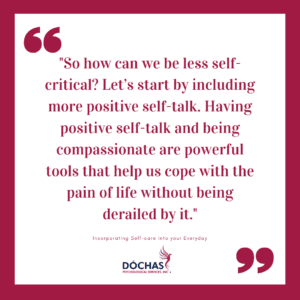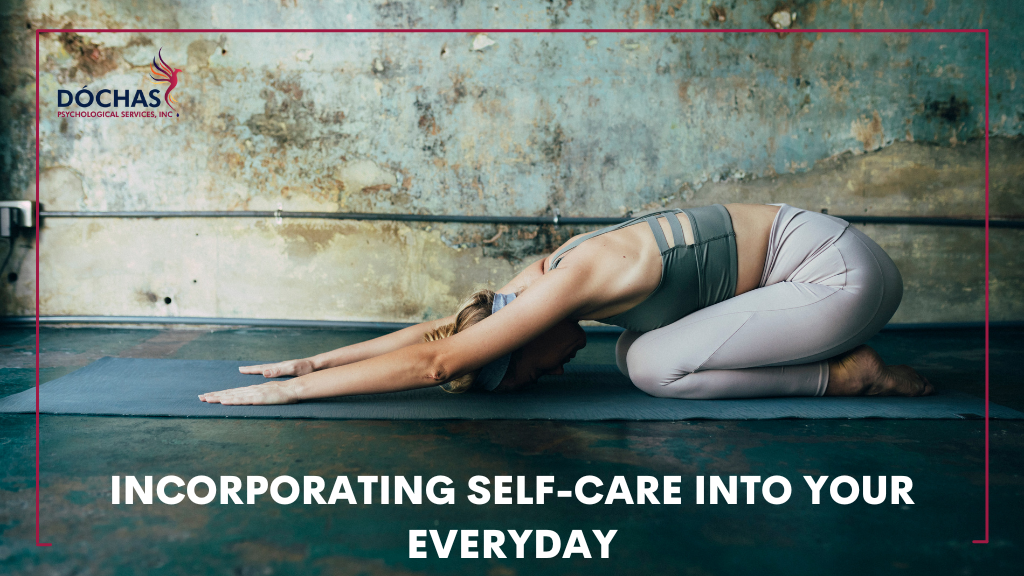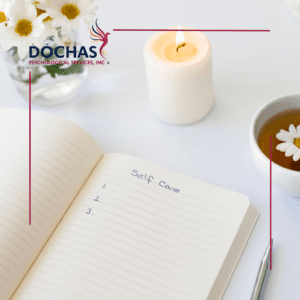Hi, it’s Annika on the Dóchas blog, and today, I am talking about incorporating self-care into your everyday. Would you agree that we live in a fast-paced and changing world? Just take a moment and look at your own life. In which life domains have your demands increased, and how are you responding to them? Does getting up earlier, staying at work later, sleeping less, reducing social interactions to finish a certain task, and ending the day in utter exhaustion sound familiar?
Does this busy schedule leave ample opportunities for rest, relaxation, and ‘me time’? Because if we don’t take care of ourselves, we might encounter problems including burnout, overwhelm, stress, and illness. Thankfully, a trend seems to be developing which focuses on personal care and being mindful as important aspects of a healthy, happy, and fulfilled life. You may have heard about this practice: It is called self-care, but what does self-care mean to you?
Barriers and Benefits of
Why does it seem so difficult to take time for us and engage in self-caring activities?
- Maybe we believe caring for ourselves is rude, a luxury, and self-indulgent.
- Maybe we think that putting others first makes us better people.
- Maybe we have been raised to please everyone, work hard, and be the fastest or busiest.
Besides these convictions, other barriers that can keep you from incorporating self-care into your everyday might include time and money, feeling guilty about considering your own wants and needs, and your cultural background. Additionally, somehow it seems easier to be kind to ourselves when we are faced with fewer demands, experience less stress, and when we have lots of free time.
What about when life gets busy, and our stress increases? Do we think that we can outsmart ourselves by trying to do the bare minimum and call a 20-minute bubble bath on the weekend or a seven-day vacation sufficient self-care? This is not how self-care works. Although a bubble bath or a vacation are wonderful ways to treat ourselves well, they are simply not enough to provide us with the adequate rest and care we need to reduce adverse effects and meet our many demands in the long run.
Self-Care for Daily Life
Research shows regular self-care boosts our emotional, mental, and physical health. It helps decrease stress, anxiety, and depression. It also reduces physical illnesses such as heart disease and strokes, improves concentration and energy, and contributes to self-esteem, happiness, and contentment. Being self-caring means being kind and empathic with yourself. It means creating a positive relationship with yourself, getting to know who you are, letting go of what pulls you down, and learning more about healthy ways of dealing with your thoughts and feelings. Self-care also means living relationships based on respect, setting boundaries that fulfill your needs, and designing your life in a way that helps you feel comfortable in it and promotes you to blossom and develop. So why incorporating self-care into your everyday ? Self-care is very individual, and what works for you may not work for someone else, but it’s important to discover what works for you.
What Can Self-Care Look Like?
- Be Aware of Your Needs
Self-care helps us to meet our needs with kindness and compassion, and for that, we must be aware of them first. It might be helpful to have two or three alarms set throughout the day that remind you to stop and listen to your needs: How am I feeling? Am I thirsty or hungry? Am I angry or content, and what need is at the root of that feeling? When you find out what your need is, fulfill this need by putting on a sweater if you are cold or drinking some water if you are thirsty.
- Set Healthy Boundaries and Respect Them
Setting personal boundaries helps us honour and respect our own emotional, psychological, and physical needs. If it is challenging for us to say ‘no,’ let’s consider this: Before automatically saying ‘yes’ and regretting it afterwards, we can take a breath and say that we first have to “check our calendars” or “talk with our partner.” This buys some time to decide how to proceed, and if we want to say ‘no,’ we can practice that ahead of time.

- Reduce Being Self-Critical
This is easier said than done, right? But being kind and compassionate to ourselves means learning to accept and embrace ourselves, including our weaknesses and growth areas.
So how can we be less self-critical? Let’s start by including more positive self-talk. Having positive self-talk and being compassionate are powerful tools that help us cope with the pain of life without being derailed by it. And honestly, how would we talk to a friend who is experiencing a challenging time? Would we be critical and judgmental, or would we speak kindly and meet them with compassion? Most likely, we will be empathic, but do we extend that kindness to ourselves? So, I want to encourage us to catch our negative self-talk and correct it diligently!
These are just a few impulses that can help you integrate self-care into your everyday, and there are many other ways to practice self-care. They might include doing something you enjoy, such as; hiking, journaling, painting, or listening to music. Be creative. Find out what relaxes YOU! Be authentic to who you are and take your needs seriously. There is only one of you in this world, and you are so valuable.
If you are feeling overwhelmed and stressed due to life’s demands, know that you don’t have to cope with this on your own. We are here and can help identify symptoms of distress and develop strategies with you to reduce stress which can enable you to regain balance. I encourage you to reach out and ask us how we can help. You can contact us here by calling us at 780-446-0300 or emailing us at info@dochaspsychologicalservices.com. In the meantime, take good care of yourself.
About Dóchas Psychological
Dóchas Psychological Services is a well-established and trusted therapy clinic located in Spruce Grove, Alberta. At Dóchas we value the idea that everyone deserves a safe space. Through connection and education, our team works hard to build a trustworthy relationship with each of our clients. It is our goal to create a community for our clients to feel like they belong.
Disclaimer
Information provided through Dóchas Psychological Services blogs or vlogs is meant for educational purposes only. They are NOT medical or mental health advice. You can read more about our disclaimer here.


